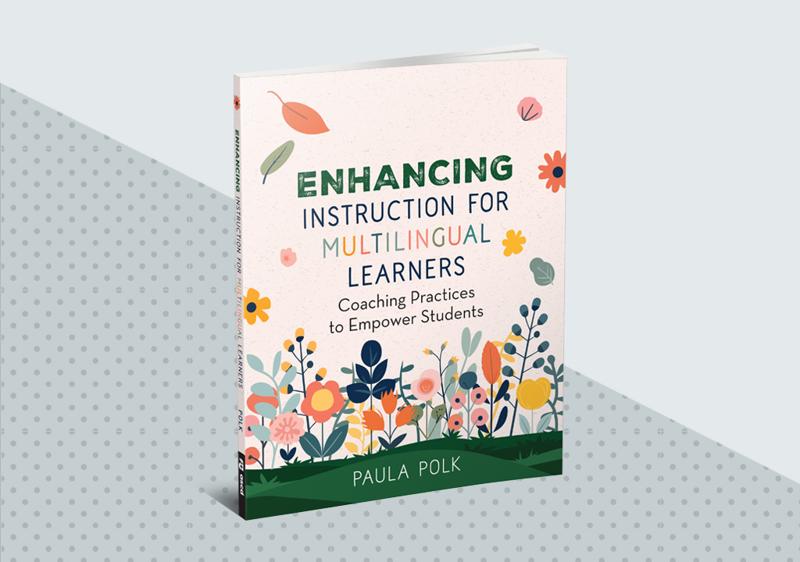What makes an instructional coach effective—especially when supporting multilingual learners? In Enhancing Instruction for Multilingual Learners: Coaching Practices to Empower Students (ASCD, 2025), educator Paula Polk urges coaches to begin by looking inward. As the number of multilingual students in schools continues to rise, Polk offers a practical framework grounded in motivation, mindset, and moves to help instructional leaders foster equity-focused, teacher-centered growth. While the book centers multilingual learners, its guidance applies to all educators looking to strengthen their coaching practices—starting with the foundational skill of self-awareness. It Begins with Self-Awareness
“Coaching is people work.” This statement, made by my own coaching mentor Laurea Myers, often plays in a loop in my head, particularly when I’m facing a coaching challenge. Her words describe a coach and their work—someone devoted to the success of others. Being able to serve others comes only with a great deal of self-awareness and internal work. Awareness of our own interpersonal or “soft” skills informs our style of coaching and how we show up as a coach with our coaches. For example, if I know I’m prone to thinking about how I’ll respond while others are speaking, I can paraphrase to hold myself accountable for committed listening. However, the only way that I know to hold myself accountable is if I’m first aware of my own communication skills. Self-awareness is the foundation of coaching because without it, we can’t successfully do “people work.”
As we work with others, the interactions, conversations, conflicts, and experiences we have with them lend themselves to moments of self-awareness. Planning with a team of teachers who have a tendency to veer off topic and therefore develop minimal plans might make me realize how much I value decision making and efficiency. Conversations with a teacher who begins every interaction asking me for a favor rather than asking how I’m doing might make me notice that personal connection is important to me. Our everyday work with others can provide moments of clarity around our core values.
Self-awareness is the foundation of coaching because without it, we can’t successfully do 'people work.'
It’s crucial, therefore, to intentionally engage in developing self-awareness. My self-awareness journey involved lots of reading, journaling, and reflecting. Practicing self-awareness through interactions with teachers, coaches, principals, and administrators formed my core beliefs about coaching. Of course, one need not have the title of coach to coach. A principal, for instance, can choose to lead a building using a coaching style to develop educators rather than simply “managing” them. A classroom teacher often coaches students and fellow teachers by providing feedback and asking questions, key communication moves of coaching.
Six core beliefs should undergird our coaching; these fall under the categories of motivation, mindset, and moves (see Figure 1.1). What should motivate our coaching work? What mindset should a coach have? What moves make for effective coaching?
Motivation
Motivation is the willingness to do something or is something that causes such willingness. This definition strikes at the heart of coaching. Motivation is our “why.” Why did you become a coach or decide to lead from a coaching lens? Why is the success of multilingual learners important to you? It might be helpful to journal your answer to these questions, another step in the journey of self-awareness.
Mindset
Mindset is a person’s way of thinking. In the framework of the core coaching beliefs, mindset represents the “head” of coaching—how we engage our minds in the work we do as coaches. We exert mental labor as we plan conversations and learning experiences with those we coach.
Moves
The Cambridge Dictionary defines moves in this way: “to (cause to) progress, change, or happen in a particular way or direction.” Moves are the hands of coaching; they describe the larger actions that underlie all of our smaller coaching moves.
The concept of partnership underlies the work of a coach. To build the capacity of teachers, a coach must engage as a full partner, understanding that they have as much to learn from the teacher as the teacher has to learn from them. The idea of partnering is key when engaging adult learners. American educator Matthew Knowles’s principles of adult learning tell us that adults
Need to know why they’re learning something.
Learn by doing, thereby needing to be involved in their learning.
Thrive in problem-centered learning.
Prefer learning that is relevant and of immediate use.
Enhancing Instruction for Multilingual Learners
Teachers need more help supporting multilingual learners, and the right coaching moves can make a difference.









